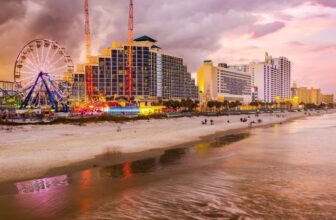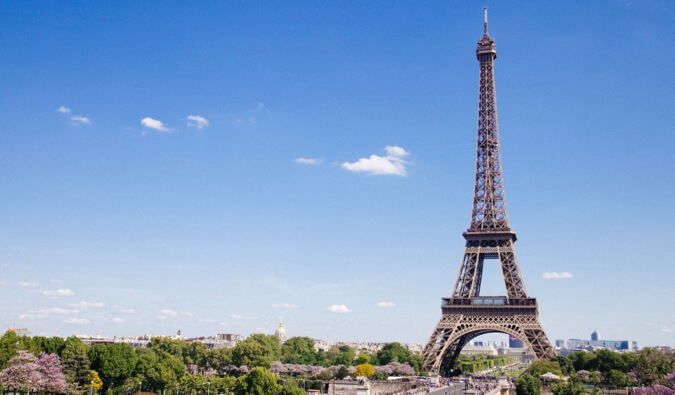
[ad_1]
Last Updated: 5/13/23 | May 13th, 2023
Paris. It’s one of my favorite destinations in the entire world and a city that would take a lifetime to see.
I’ve been to the city more times than I remember — I even moved there for a while — yet I’ve barely scratched its surface.
Understandably, planning a trip to Paris is hard. Just when you think you’ve seen everything the city has to offer, you find new attractions, new cafés, or new markets to explore (not to mention visiting Disneyland Paris). There are layers to this city — which is partially why I love it so much.
Most travelers seem to visit Paris for around three days before moving on. They see the highlights, snap some photos, and move on.
While three days is better than nothing, I think you need more time than that. Ideally, I think you should plan on spending at least five days in Paris in order to see the bare minimum of what the City of Lights has to offer. There’s just too much to do.
To help you plan your trip to Paris and figure out what to see, what to do, where to stay, and where to eat, here’s my suggested itinerary for a five-day visit (and some other suggestions in case you decide to spend longer there!)
Paris Itinerary Highlights
-
Day 1: Champs-Élysées, Arc de Triomphe, the Latin Quarter, & more!
Day 2: Louvre, Musée d’Orsay, Musée de l’Orangerie, & more!
Day 3: The Palace of Versailles, Père Lachaise Cemetery, & more!
Day 4: Eiffel Tower, Les Invalides, Holocaust Museum, & more!
Day 5: Paris Catacombs, Rue Mouffetard, Musée de Cluny, & more!
Where to Eat: My Favorite Restaurants in Paris
What to See in Paris: Day 1
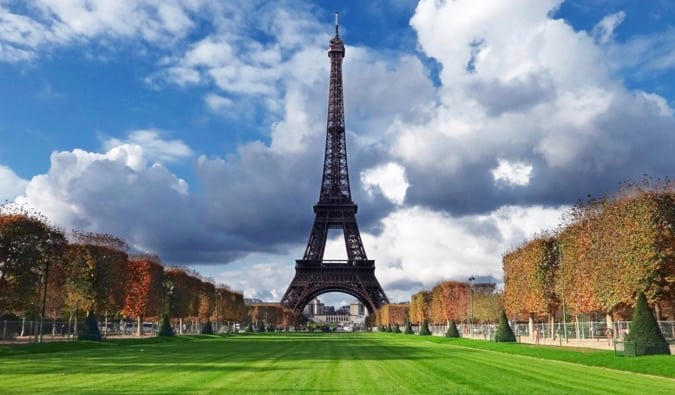
Spend your first day walking around Paris. There’s a lot to see, and you can spend a good half day (or whole day) wandering the cobblestone streets, parks, and neighborhoods of the city. If you want to orient yourself with a free walking tour, New Europe runs regular walking tours that cover the highlights. Just make sure to tip your guide at the end.
For paid tours, check out Get Your Guide. They have all kinds of walking tours (as well as museum and food tours). There’s something for every interest!
However, if you want to follow my own walking tour, here’s my suggested route for an “orientation walk” around Paris:
Start at the Champs-Élysées and see the Arc de Triomphe. There isn’t usually a line, and you’ll get sweeping views of the city to start your day. Stroll down the Champs-Élysées and through Place de la Concorde, where you will see the Luxor Obelisk, which the French stole from the Egyptians. It’s over 3,000 years old and stands 75-meters (246 feet) tall. This square was also where they guillotined people during the French Revolution (1789-1799).
Walk down the Champs-Élysées through the Jardin des Tuileries, a beautiful garden that was once home to a palace that burned down in the 1800s. Stop and admire the Louvre before continuing down Rue Rivoli and crossing into the original section of the city on the Île de la Cité. This is where the Romans built their original settlement, (called Lutetia, which was the basis for the modern-day city of Paris.
Enjoy the Pont Neuf and the statue of Henry IV. This stone bridge, the first in Paris, was built in 1578. Stroll to my favorite church of all time, Sainte Chapelle, with its incredible 12th-century stained glass. There’s usually a line, so book tickets in advance (11.50 EUR) if you want to see the interior.
After that, head to the underground Roman ruins and then visit Notre Dame, the world’s most famous Gothic church. It was damaged in a fire in 2019 and is still closed, however, you can still admire the building as it’s still being repaired.
Next, head south toward the Latin Quarter. This area is rather touristy but if you get off the main drag, you’ll find yourself in a labyrinth of alleys and café-lined squares that are far away from the local tourist hangouts.
Visit the Pantheon and honor France’s most famous dead citizens before heading west toward the Jardin du Luxembourg, where you can relax and watch life go by. There’s great people-watching here, and it’s one of the best parks in the city.
After that, head north to see Saint Sulpice. If you’re into The Da Vinci Code, you’ll be looking for symbols and hidden meanings throughout this church. If symbols don’t interest you, just marvel at how grandiose this place is.
By this time, it should be late in the afternoon and a perfect time to stop in a café, order some wine, and relax the Parisian way.
What to See in Paris: Day 2
The Louvre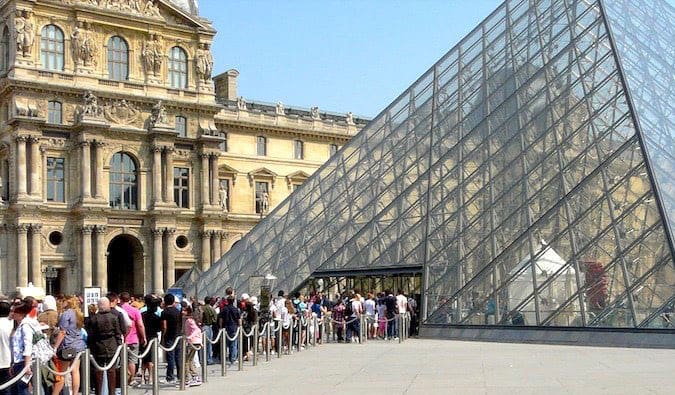
With over a million pieces of art, you could spend a whole month in the Louvre and still not see everything. I don’t particularly enjoy medieval art; it’s too religious for me, and I can only see so many pictures of Mary and Jesus before I get bored.
If that’s not your thing, there are plenty of impressionist period gems like Monet, Renoir, Cézanne, and other masters. Nevertheless, the museum is worth seeing, and I spent about five hours exploring all the masterpieces and marveling at the old royal palace. You could easily spend more time if you’re an art buff too. If you’d just like to see the highlights, expect to spend a couple of hours.
Timed skip-the-line tickets cost 17 EUR.
Musée du Louvre, 1st arrondissement, +33 1 40 20 53 17, louvre.fr. Open Monday, Wednesday, Thursday, and weekends from 9am–6pm, and Fridays from 9am–9:45pm. Closed Tuesdays. Admission is 17 EUR. They also offer free admission for all visitors on the first Sunday of each month October-March and on Bastille Day (14 July). Admission is also free for EU residents under 26. To avoid the massive lines, enter via the Carrousel du Louvre entrance and you’ll get right to the ticket counter. You can also skip the lines if you have a Paris Museum Pass.
Musée d’Orsay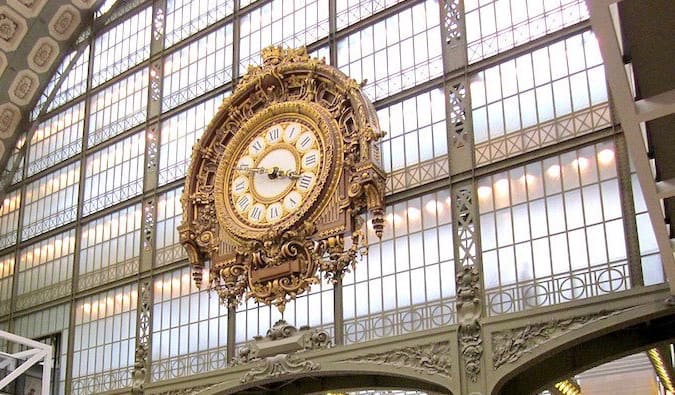
The Musée d’Orsay, located in close proximity to the Louvre, houses the best impressionist and post-impressionist work in Paris. It’s one of the largest museums in Europe and my favorite museum in Paris. I always go when I’m in town. The museum sees over 3 million visitors each year and is home to masterpieces by all the great artists of the world, including Degas, Monet, Manet, and Van Gogh, to name a few. I could spend hours here and never get bored.
1 Rue de la Légion d’Honneur, 7th arrondissement, +33 1 40 49 48 14, musee-orsay.fr. Open Tuesday, Wednesday, Friday-Sunday from 9:30am–6pm and Thursdays from 9:30am–9:45pm. Closed Mondays. Admission is 17 EUR (or 9 EUR after 4:30pm every day but Thursday). It’s free on the first Sunday of the month.
Musée de l’Orangerie
Finish off a wild museum day with this Monet showcase. The museum displays eight tapestry-sized Nymphéas (water lilies), housed in two plain oval rooms. Monet painted these images later in his life, and each one represents a different time of day and season. There’s a bottom floor that shows other works too. It’s a beautiful museum.
Jardin des Tuileries, Place de la Concorde, 1st arrondissement, +33 1 44 50 43 00, musee-orangerie.fr. Open Wednesday-Monday from 9am–6pm; last entry at 5:15pm. Closed Tuesdays. Admission is 12.50 EUR and is free on the first Sunday of the month.
Budget travel tip: Get the Paris Museum Pass. This pass covers over 50 museums and attractions in Paris. It covers all the museums above, so getting this pass and using it to see all the attractions listed in this article will save you a ton of money. A two-day pass costs 55 EUR, a four-day pass costs 70 EUR, and a six-day pass costs 85 EUR.
NOTE: People will say “That’s too much to do in a day! Those museums take a day each! And they are right. These museums can actually take DAYS to see. But, if you’re short on time, you can see the highlights of each in a very long day. Or don’t and take your time in each museum. This itinerary is just a mere suggestion anyways!
What to See in Paris: Day 3
The Palace of Versailles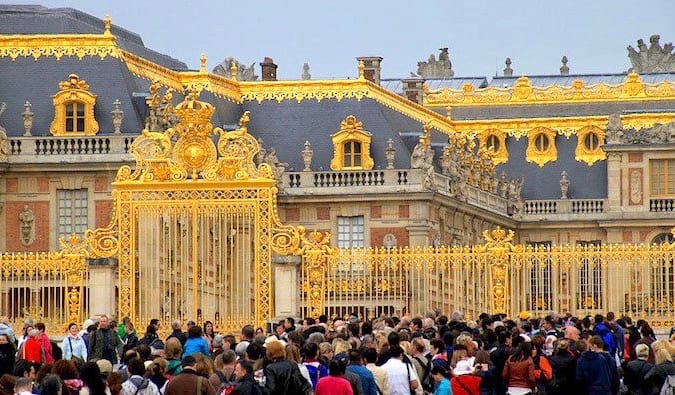
Located just outside of Paris, the Palace of Versailles was a hunting lodge before becoming the primary residence of the Kings of France until the French Revolution. A decadent symbol of royal power, the palace sees over 10 million visitors each year.
It takes a full day to really enjoy a trip here. Spend the day exploring the château, get lost in the surrounding gardens, and soak up the extravagant lifestyle of France’s former monarchy. Make sure you see the estate of Trianon (known as Marie Antoinette’s estate) as well, which includes a fake peasant village created to provide scenic views and fresh milk and eggs for the Queen.
Versailles is massive and beautiful so don’t rush your visit. Most people see the Palace first, then the gardens, and then Marie-Antoinette’s estate. If you do everything in reverse, you’ll be able to avoid the crowds. Additionally, go on a weekday to avoid the worst of the crowds.
Here’s a video tour of the Palace of Versailles to whet your appetite:
Place d’Armes, Versailles, +33 1 30 83 78 00, en.chateauversailles.fr. Open Tuesday–Sunday 9am–5:30pm with the last entry at 5pm. Closed Mondays. “The Passport” ticket gives you admission to all the palace tours (grounds, Trianon Palaces, and Marie Antoinette’s estate), the Musical Fountain Show, the Musical Gardens, and the exhibitions for 28.50 EUR (21.50 EUR during the low season). Guided tours with skip-the-line access cost 55 EUR.
Père Lachaise Cemetery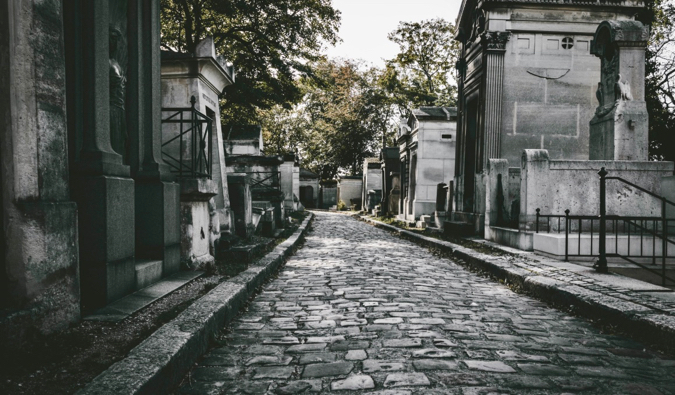
Finish off the day with a train ride east of the city center to visit Paris’s most famous graveyard, where you’ll see the graves of celebrities like Antonio de La Gandara, Honoré de Balzac, Sarah Bernhardt, Frédéric Chopin, Jim Morrison, Édith Piaf, Camille Pissarro, Gertrude Stein, and Oscar Wilde.
Built in 1804, it’s named after Louis XIV’s confessor, Père François de la Chaise (1624–1709), who lived in a house near the cemetery. Initially, the locals considered the cemetery too far from the city so administrators devised a plan. They moved the remains of Jean de La Fontaine (fabulist) and Molière (playwright), two of Paris’s most famous artists, to Père Lachaise, hoping that people would want to be buried near France’s famous heroes.
It worked, and today it’s the city’s most iconic graveyard — and the most visited cemetery in the world. Just make sure you’re out before it closes at 5:30pm.
Guided tours cost 20 EUR and last three hours.
What to See in Paris: Day 4
Eiffel Tower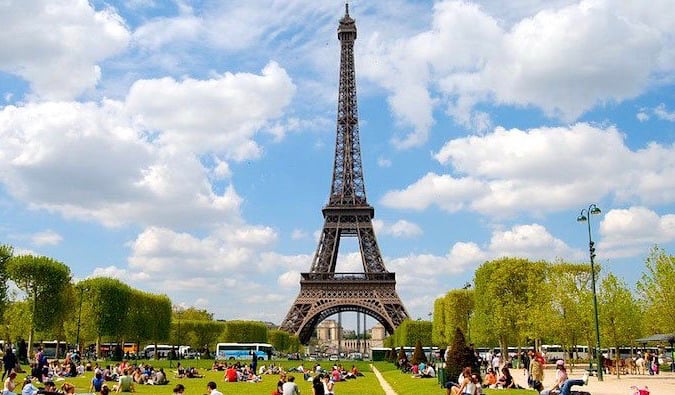
The Eiffel Tower is Paris’ most iconic monument. Built in the 1880s for the 1889 World Fair, it was actually disliked by many people when it was first built. Today, the locals love it; it’s a symbol of the city and one of the most recognized buildings in the world. Standing 324 meters (1,062 feet) tall, it offers the best views of the entire city. To beat the crowds, get here early in the morning. If you wait until the afternoon, you’ll find yourself waiting in line for hours.
Afterward, have a picnic on the grass and enjoy the sunshine and the views. It’s one of my favorite things to do in the city.
Champ de Mars, 7th arrondissement, +33 8 92 70 12 39, toureiffel.paris. Open daily (9am–midnight) during the summer, with slightly shorter hours during the rest of the year. Admission is 18.10-28.30 EUR per person, depending on how high you go. You can also pay for direct access to an elevator that takes you to the top for 52 EUR.
Wander Rue Cler
Located near the Eiffel Tower, this street is filled with good Parisian eateries. You’ll find cheese, meat, bread, vegetable, and chocolate stores to explore. I never walk away from this street without a pile of food and wine.
Whenever I’m here, I eat my way through this street and then buy more for later. It’s one of my favorite streets in Paris.
Paris Sewer Museum
This tour is definitely an off-the-beaten-path attraction and isn’t too far away from the Eiffel Tower. You’ll learn about the interesting history of Paris’s sewer system.
You may be put off by the idea of a “sewer tour,” but don’t be. It doesn’t smell down there and you’ll learn how modern Paris came to be. Before there was a suitable drainage system, waste from the city just ended up in the river. It then spread disease and polluted the entire area, putting the entire city at risk. It wasn’t until the city developed a complex sewer system that it was able to overcome diseases, boost trade, and develop into the world-class city that it is today.
Pont de l’Alma, Left Bank, opposite 93 Quai d’Orsay, 7th arrondissement, +33 1 53 68 27 81, musee-egouts.paris.fr/en/. Open Tuesday to Sunday from 10am–5pm. Admission is 9 EUR.
Les Invalides (The Tomb of Napoleon)
Also known as Hôtel National des Invalides, this enormous complex was built in 1670 by Louis XIV as a hospital for wounded soldiers. Nowadays, it’s home to several museums and monuments, including the Musée de l’Armée (the Military Museum of the Army of France) and Napoleon’s tomb. It is one of the most comprehensive history museums I’ve ever visited, and you’ll need at least three hours to see it properly.
While military history may seem boring, this museum is really a history of France, the Revolution, and Napoleon. It is fascinating and incredible in its depth. I cannot recommend it enough.
Place des Invalides, Musée de l’Armée, 129 Rue de Grenelle, 7th arrondissement, +33 810 11 33 99. Open daily from April through October (10am–6pm; Tuesdays until 9pm), and 10am–5pm from November through March. Admission is 14 EUR.
The Museum of the Shoah (The Holocaust Museum)
Despite having an excellent exhibit on France, anti-Semitism, and the Holocaust, the Museum of the Shoah never draws a lot of people. It’s a real shame, as the information and collection here is really great and in-depth. I’ve been to many Holocaust museums, and this is one of the best and most detailed in the world. I highly recommend it.
17 Rue Geoffroy l’Asnier, 4th arrondissement, +33 1 42 77 44 72, memorialdelashoah.org. Open Sunday–Friday 10am–6pm and Thursdays from 10am–10pm. Closed Saturdays. Admission is free and a free guided tour is given at 3pm (in English) on the second Sunday of every month.
What to See in Paris: Day 5
Paris Catacombs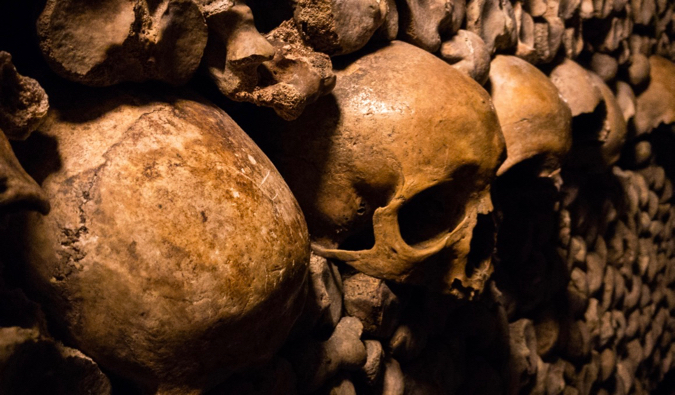
The Catacombs of Paris are a fascinating but grim tourist attraction. They go on for miles (no one really knows how far) and the endless winding tunnels house thousands of bones. Only a small section of the tunnels is open, and there’s a ton of history and information about the growth of Paris. The Catacombs themselves are actually old stone quarries that were located far outside the edge of the city during medieval times. There’s always a long line, so book your skip-the-line tickets online beforehand and don’t wait outside!
1 Avenue du Colonel Henri Rol-Tanguy, 14th arrondissement, +33 1 43 22 47 63, catacombes.paris.fr. Open Tuesday–Sunday 9:45am–8:30pm; last admission at 7:30pm. Closed Mondays. Check the website before you go — the Catacombs are sometimes closed without warning or explanation. Admission is 18 EUR for last-minute tickets sold the day of. The audio guide is 5 EUR. Advanced tickets are 29 EUR (including the audio guide).
Rue Mouffetard
This pedestrian street is filled with cafés and shops and has an outdoor market. It’s great to just wander down or for sitting in front of a café and watch Parisian life go by. Make sure to stop by the nearby Place de la Contrescarpe too. There are some good and inexpensive restaurants in the area, making it a nice place to stop for a while and watch life go by.
Musée de Cluny
The Cluny Museum, also known as the National Museum of the Middle Ages, is the finest surviving example of medieval architecture in Paris. Built in the 15th century, it was the former home of the abbots of Cluny and now houses Roman and medieval art, including many architectural fragments found during excavations around the city.
The museum also contains the adjoining rooms of a Roman bath, which the abbey was built over. It is by far one of the most interesting history museums in the city and worth every euro of the admission fee!
6 Place Paul Painlevé, 5th arrondissement, +33 1 53 73 78 16, musee-moyenage.fr. Open Tuesday to Sunday 9:30am–6:15pm. Closed Mondays. Admission is 12 EUR and free on the first Sunday of every month.
Bibliothèque Nationale de France
One of the grandest libraries in the world, the Bibliothèque Nationale de France was founded in 1368 by Charles V. Stop in for a quick visit and be sure to take a peek at the old rotunda of the art library and the 20-foot globes in the permanent collection. The collection is massive at over 40 million items, including some 15 million books and over 5,000 manuscripts from Ancient Greece.
Quai François Mauriac, 13th arrondissement, +33 1 53 79 59 59, bnf.fr. Open Monday from 2pm-8pm), Tuesday-Saturday from 9am-8pm, and Sundays from 1pm-7pm. Admission is free.
Montmartre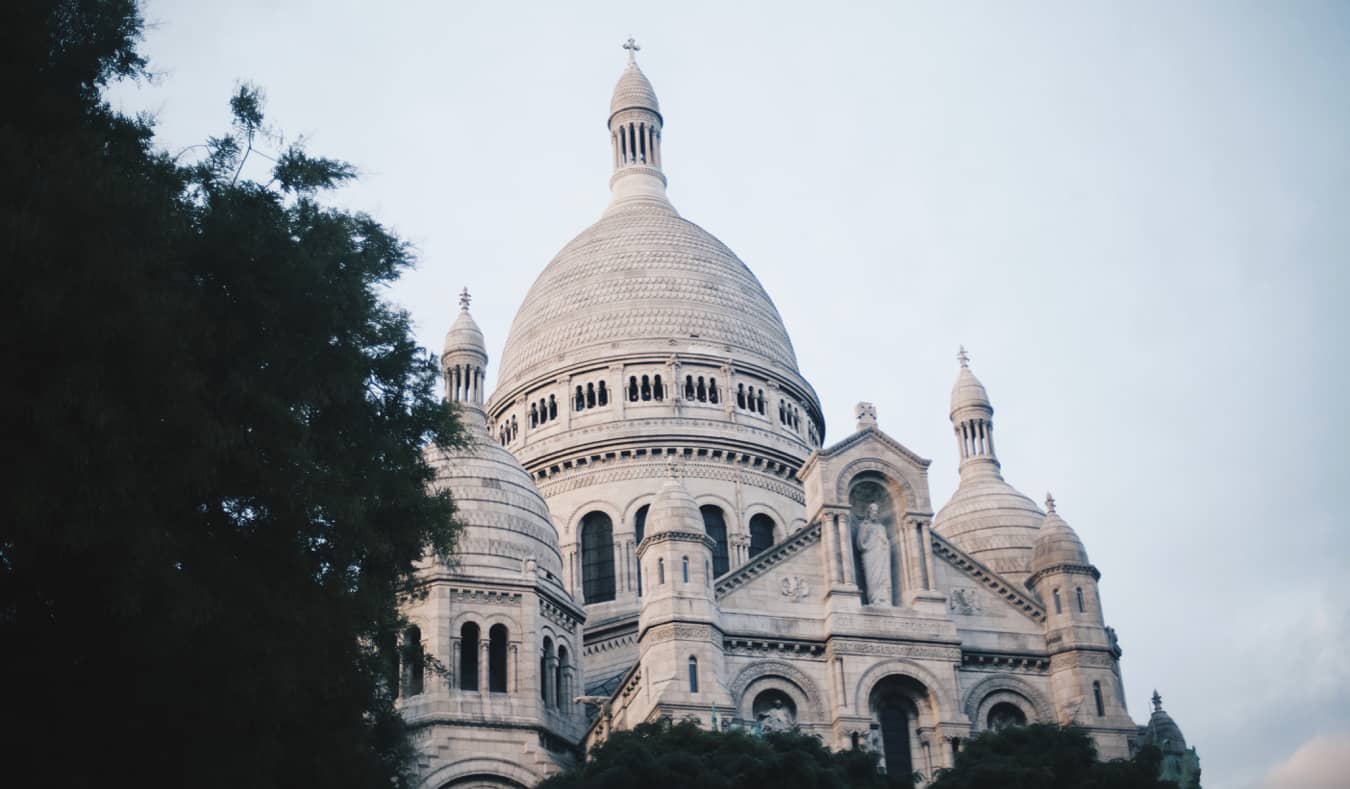
Another artistic center of Paris, this is where artists and writers like Hemingway spent their time. There’s still a lot of art, and you’ll find galleries and artists throughout the area. The streets are quiet and beautiful to wander around. Sacré-Cœur (the church here) offers a superb view of the city and is a great place to have lunch. You can also see the famous “sinking house” here too (an Insta-famous house that, from the right angle, looks like it’s sinking into the hill).
In the evening, the stairs near the church fill up with people watching the sunset, chatting, and drinking. There are usually lots of buskers here too making it one of the best places in the city to soak up the city in the evening.
Where to Eat in Paris
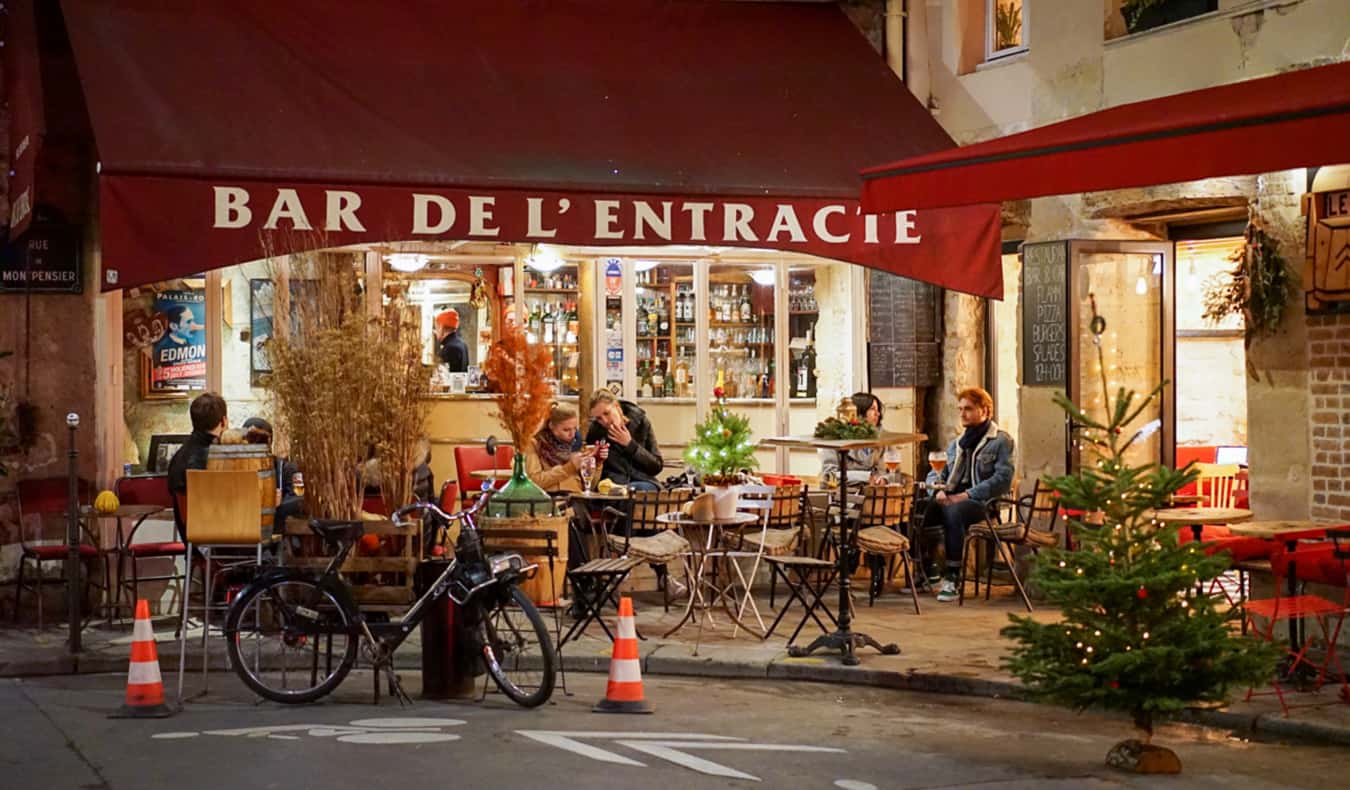
Looking for some suggested places to eat? Here are some of my favorite places to eat when I’m in Paris:
- Café Père & Fils — Café Père & Fils is a Parisian brasserie and coffee shop with outdoor seating for lunch and drinks.
- Florence Kahn — This perfect little shop has a blue mosaic shopfront. They make really delicious sandwiches — try the pastrami.
- ISTR — ISTR is extremely trendy and usually busy for dinner, but I highly recommend its happy hour, when the wine and oysters are cheap.
- King Falafel Place — Some of the best falafel in Paris. There’s usually a line but it moves quickly.
- La Crêperie des Pêcheurs — This tiny to-go crêperie is the best in all of Paris (in my opinion). Cheap, delicious, and large portions — you can’t go wrong here.
- Le Dit Vin — The prices are reasonable, there is a large wine selection, and the food is rich, savory, and delicious. The menu changes daily depending on what’s fresh.
Admittedly, even with five days in Paris, you’ll barely scratch the surface of the city. It’s just too massive, nuanced, and layered. The history, the architecture, the charm — it’s unlike any other place in the world.
However, you will still be able to see many of the highlights and get a sense of just how amazing Paris really is. But want to get away from the crowds? Want other suggestion? Here’s a list of off-beat attractions, unique walking tours, and day trips from the city.
Paris is best explored slowly. It’s a city meant to be unraveled, discovered. There’s so much that just pops up that you want to be like a local and just let your day unfold unexpectedly. Meander in the gardens and parks, take a long lunch, watch that band, sit by the Seine, and linger over that bottle of wine. Live your best life in Paris.
Use this suggested itinerary as your starting point and see where your trip takes you. I promise it won’t disappoint!
Get Your In-Depth Budget Guide to Paris!
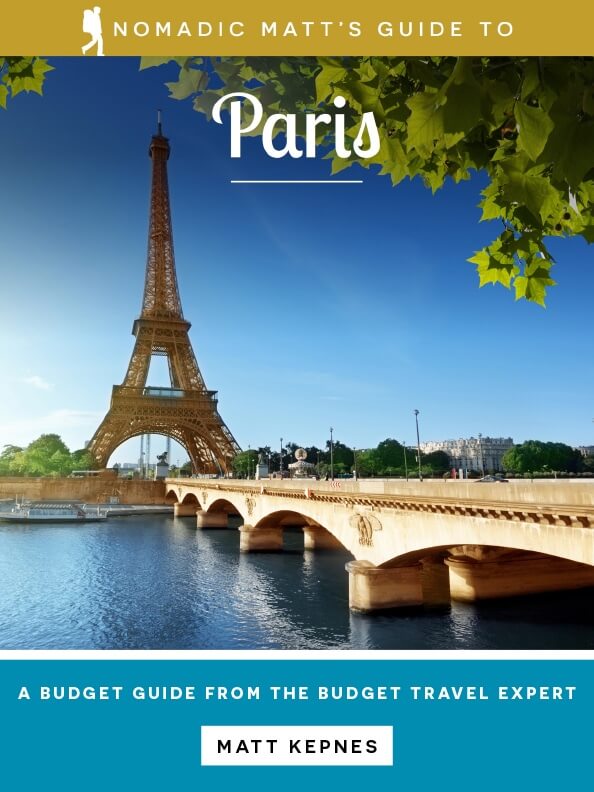
For more in-depth information, check out my guidebook to Paris written for budget travelers like you! It cuts out the fluff found in other guides and gets straight to the practical information you need to travel around Paris. You’ll find suggested itineraries, budgets, ways to save money, on- and off-the-beaten-path things to see and do, non-touristy restaurants, markets, bars, transportation and safety tips, and much more! Click here to learn more and get your copy today!
Book Your Trip to Paris: Logistical Tips and Tricks
Book Your Flight
Use Skyscanner to find a cheap flight. They are my favorite search engine because they search websites and airlines around the globe so you always know no stone is left unturned.
Book Your Accommodation
You can book your hostel with Hostelworld as they have the biggest inventory and best deals. If you want to stay somewhere other than a hostel, use Booking.com as they consistently return the cheapest rates for guesthouses and cheap hotels. Three of my favorite places to stay in the city are:
If you’re looking for more places to stay, here for my favorite hostels in Paris.
And, if you’re wondering what part of town to stay in, here’s my neighborhood breakdown of the city.
Don’t Forget Travel Insurance
Travel insurance will protect you against illness, injury, theft, and cancellations. It’s comprehensive protection in case anything goes wrong. I never go on a trip without it as I’ve had to use it many times in the past. My favorite companies that offer the best service and value are:
Need a guide?
Paris has some really interesting tours. My favorite company is Take Walks. They have expert guides and can get you behind the scenes at the city’s best attractions. They’re my go-to walking tour company.
Looking for the Best Companies to Save Money With?
Check out my resource page for the best companies to use when you travel. I list all the ones I use to save money when I’m on the road. They will save you money when you travel too.
Want More Information on Paris?
Be sure to visit our robust destination guide on Paris for even more planning tips!
[ad_2]



